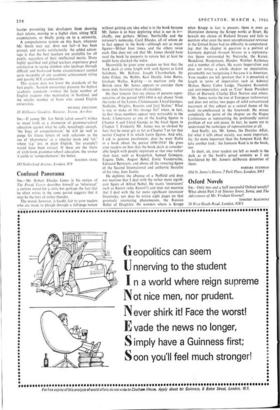Confused Panorama SIR,—Mr. Robert Rhodes James in his review of
The Proud Tower describes himself as 'infuriated,' a curious mood for a critic but perhaps the fact that he often writes in the same period suggests that it may be the fury of stolen thunder.
The mood, however, is hardly fair to your readers who are made to plough through a full-page review without gaining any idea what is in the book because Mr. James is so busy deploring what is not in it— chiefly, one gathers, Milner, Northcliffe and the reviewer's namesake, Cecil Rhodes, all of whom do in fact appear in the book—although not as major figures—Milner four times, and the others twice each. One does not ask that Mr. James should have read the book he purports to review but at least he might have checked the index.
Meanwhile he gives your readers no hint that the book deals at some length with such figures as Lord Salisbury, Mr. Balfour, Joseph Chamberlain, Sir John Fisher, the Webbs, Keir Hardie, John Burns, Graham Wallas, Kipling — to mention only the British since Mr. James appears to consider them more truly historical than off-islanders.
He then laments that my choice of persons repre- sentative of the period 1890-1914 is not drawn 'from the ranks of the Lenins, Clemenceaus, Lloyd Georges, Nuffields, Wrights, Renoirs and [sic] Stalins.' What is one to make of this strange list? when, in fact, its first three members appear very noticeably in the book: Clemenceau as one of the leading figures in Chapter 4 and Lloyd George as the focal figure in Chapter 7. Evidently Mr. James was so choked by fury that he never got as far as Chapter 7 or for that matter Chapter 8 in which Lenin figures. And why, I ask in genuine puzzlement, does he want Stalin in a book about the period 1890-1914? He gives your readers no hint that the book deals at consider- able length with people important at that time rather than later, such as Kropotkin, Samuel Gompers, Eugene Debs, August Bebel, Emile Vandervelde, Edouard Bernstein, and above all the towering figure of the Second International and authentic Socialist of his time, Jean Jaures.
He deplores the absence of a Nuffield and does not mention that I deal with the rather more signifi- cant figure of Alfred Nobel. He wants 'innovators' such as Renoir (why Renoir?) and does not mention that I deal with the far more significant innovator Stravinsky, nor does he notice eight pages on that genuinely innovating phenomenon, the Russian Ballet of Diaghilev. He wonders where is Krupp when Krupp in fact is present; there is even an illustration showing the Krupp works at Essen. He bewails my choice of Richard Strauss and fails to mention what even the most unsophisticated reviewer in the United States had no difficulty in comprehend- ing: that the chapter in question is a portrait of Germany depicted through Strauss as a representa- tive figure surrounded by Nietzsche, the Kaiser, Wedekind, Hauptmann. Harden, Walther Rathenau and a number of others. He wants Imperialism and does not notice a whole chapter on imperialism, presumably not recognising it because it is American. Your readers are left ignorant that it is presented at length in terms of imperialists such as Admiral Mahan, Henry Cabot Lodge, Theodore Roosevelt and anti-imperialists such as 'Czar' Reed, President Eliot of Harvard, Charles Eliot Norton and others.
Mr. James wants the rise of European technocracy and does not notice two pages of solid concentrated treatment of this subject as a central theme of the book (re-emphasised in the foreword). He misses completely the point of the chapter on the Hague Conferences as representing the profoundly central problem of war and peace. In fact, he seems not to understand the technique of representation at all.
And finally, yes, Mr. James, the Dreyfus Affair, for what it tells about society, was more important, far, far more important than the Jameson Raid. But take another look : the Jameson Raid is in the book, too.
In short, sir, your readers are left as much in the dark as to the book's actual contents as I am bewildered by Mr. James's deliberate distortion of them.


































 Previous page
Previous page